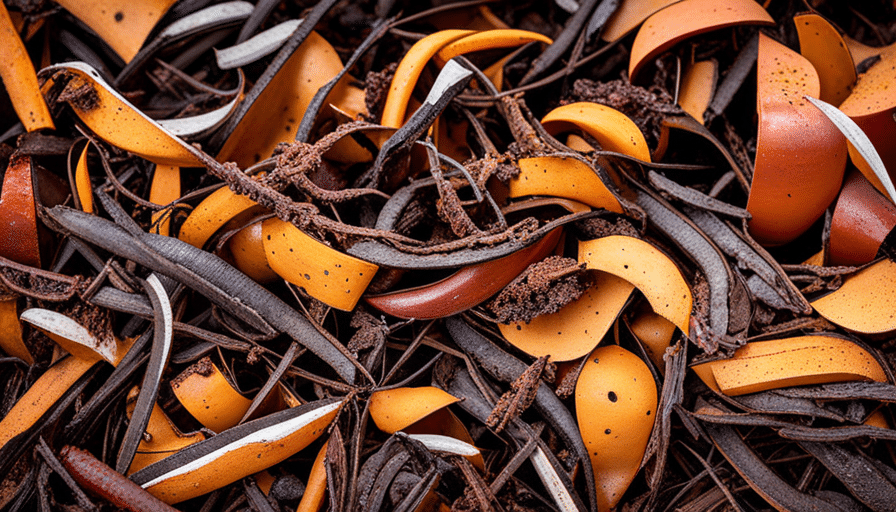Do you have rusted metal items lying around your garden or backyard? Have you ever wondered if these rusty materials can be composted instead of being thrown away? The good news is that rust can indeed be composted, but there are some important factors to consider before tossing it into your compost pile.
Firstly, it’s important to understand what rust is and its composition. Rust is an iron oxide that forms when iron or other metals come into contact with oxygen and water. It’s a common occurrence in outdoor environments and can be found on anything from old tools and furniture to fencing and decorations.
While rust may seem like a nuisance, it actually contains valuable nutrients such as iron, which can benefit your composting process if used correctly.
Key Takeaways
- Rust can be safely added in small amounts to compost as it contains valuable nutrients like iron.
- Rust formation requires iron/metal compounds, oxygen, and water/moisture.
- Rust cannot decompose like organic matter, but it can speed up the decomposition process in compost.
- Composting can be aerobic (with oxygen) or anaerobic (without oxygen), and rust can be added to either type of composting as long as it does not contain harmful chemicals like lead or cadmium.
Understanding Rust and its Composition
So, you’re wondering if you can compost rust? Well, unfortunately, the answer is no because rust is primarily composed of iron oxide and does not decompose like organic matter.
Rust formation happens when iron or metal compounds react with oxygen in the presence of water or moisture. This reaction leads to the creation of iron oxide, which appears as a reddish-brown substance that we commonly refer to as rust.
The corrosion process that causes rust can happen due to exposure to air and water, high humidity levels, or acidic substances. When metals corrode due to these factors, they lose their structural integrity and eventually crumble away.
However, unlike organic matter such as food scraps and yard waste that break down into nutrient-rich soil amendments through composting processes, rust remains unchanged and cannot be composted.
The Science of Composting
As you mix together your food scraps and yard waste, they begin to break down into a rich, dark soil that will nourish your garden. This process is called composting, and it involves the decomposition of organic matter by microorganisms.
There are two types of composting: aerobic and anaerobic. Aerobic composting involves providing oxygen to the microorganisms that break down the organic matter. This method produces less odor and results in a faster breakdown of the materials.
Anaerobic composting, on the other hand, occurs without oxygen and can produce unpleasant odors. However, it can be useful for breaking down materials that would not decompose easily otherwise. Regardless of which method you choose, composting has numerous benefits for soil health as it enriches the soil with nutrients and improves its structure.
Can Rust Be Composted Safely?
Although it may seem counterintuitive, rust can actually be safely added to your compost bin as long as it is not in large quantities and does not contain any harmful chemicals.
Rust is a form of iron oxide that can help speed up the decomposition process of organic materials in your compost pile. When rust comes into contact with moist soil and air, it creates an environment that is conducive for microorganisms to break down organic matter.
However, it’s important to note that rust should only be added in small amounts because too much of it can create a toxic environment for your composting materials. Additionally, if the rust contains harmful chemicals such as lead or cadmium, then it should not be added to the compost pile at all.
In summary, rust can be a useful addition to your compost bin as long as you exercise caution and ensure that you’re not adding anything harmful to the mix.
Best Practices for Composting with Rust
To ensure that your composting process with rust is effective, it’s important to follow these best practices.
Firstly, make sure to regularly clean and maintain your composting tools to prevent rust buildup. When using metal tools such as shovels or pitchforks for turning the compost pile, wipe them down after each use and store them in a dry place to avoid moisture buildup.
In addition, consider investing in rust prevention methods such as coating your tools with a layer of oil or wax. This will help protect them from moisture and rust formation, ensuring their longevity and effectiveness in the composting process.
By taking these steps, you can ensure that your composting with rusty tools goes smoothly and efficiently.
Frequently Asked Questions
Can rust affect the quality of the compost?
Rust can harm the quality of compost by limiting plant growth. Rust prevention techniques like using rust-resistant materials and keeping compost dry can prevent this. Don’t let your hard work go to waste, take steps to avoid rust!
Is it safe to use compost with rust on edible plants?
It’s not safe to use compost with rust on edible plants due to the risks of rust contamination. Rust removal techniques for composting include using a magnet or sifting through the compost to remove any rust particles.
Can rust accelerate the composting process?
Oh, definitely! Rust is a great addition to your compost pile. It speeds up the rust decomposition process and helps break down other organic matter faster. Just make sure to use proper composting techniques and keep the balance of materials in check.
How long does it take for rust to fully decompose in compost?
It can take a while for rust to fully decompose in compost. Chemical reactions and environmental factors like moisture, temperature, and oxygen levels all play a role in breaking down the rust.
Can composting rust attract pests or rodents?
Watch out for pests! To prevent them, make sure your compost is well-maintained and cover it properly. Rust prevention can also help keep your garden critter-free.

